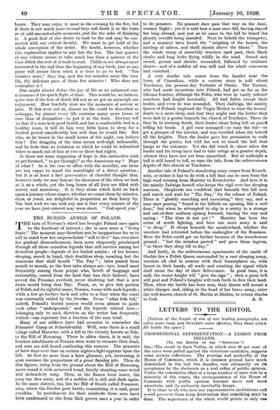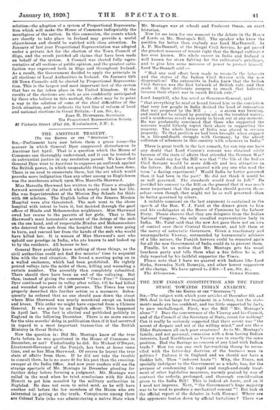LETTERS TO THE EDITOR.
[Letters of the length of one of our leading paragraphs are often more read, and therefore more effective, than those which fill treble the space.] PROPORTIONAL REPRESENTATION.-1 LESSON FROM IRELAND.
[To THE EDITOR OF THE " SPECTATOR."3 Sur,—The result in Span Valley, in which over SO per cent. of the votes were polled against the victorious candidate, suggests some serious reflections. The prestige and authority of the House of Commons, which it is common ground have much diminished in the last two decades, rest ultimately on its acceptance by the electorate as a real reflex of public opinion. Under the cumulative effect of a large number of seats won by a minority of the voters, the correspondence of the House of Commons with public opinion becomes more and more uncertain, and its authority inevitably decays.
It is clear to all who love our representative institutions and would preserve them from destruction that something must be done. The experience of the whole world points to only ono solution—the adoption of a system of Proportional Representa- tion which will make the House of Commons indisputably the mouthpiece of the nation. In this connexion, the events which are shortly to take place in Ireland may provide a useful object-lesson and should be watched with close attention. In January of last year Proportional Representation was adopted under a private Act for the election of the Town Council of Sligo, and the result justified all claims that have been made on behalf of the system. A Council was elected fully repre- sentative of all sections of public opinion, and the greatest .satis- faction was expressed both in Sligo and throughout Ireland. As a result, the Government decided to -apply the principle in all elections of Local Authorities in Ireland. On January 15th 126 Town Councils will be elected by Proportional Representa- tion. This is the largest and most important test of the system that has SO far taken place in the United Kingdom. If the results of the elections are such as are confidently anticipated by those who believe in this method, the effect may be to point a way to the solution of some of the chief difficulties of the Irish situation, and to indicate the best line of reform of local and national elections in Great Britain.—I am, Sir, &es JOHN H. HUMPHREYS, Secretary. The Proportional Representation Society. 82 Victoria Street (Flat 24), Westminster, S.W. 1.



































 Previous page
Previous page